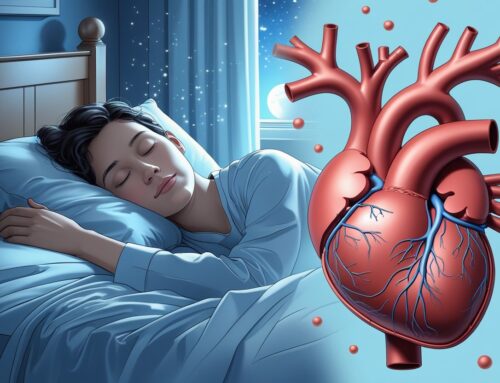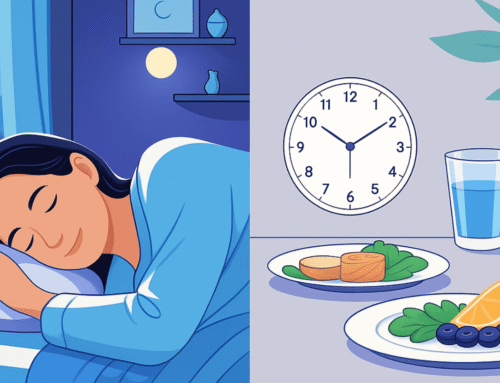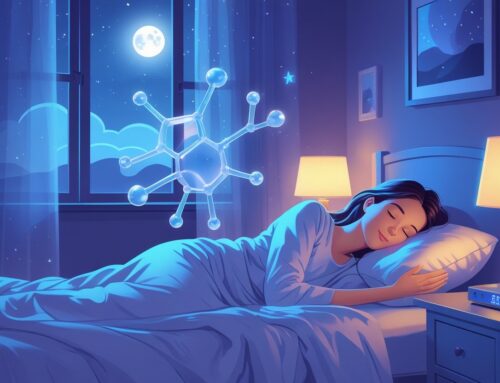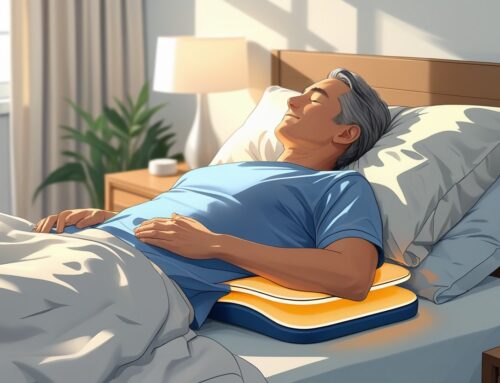Many people with anemia find it hard to sleep well at night. The condition can cause issues like insomnia or restless sleep, making it difficult for the body to recharge. Low iron levels are usually the reason. When the blood doesn’t carry enough oxygen, the body struggles to rest properly, and normal sleep cycles can get disrupted.
Sleep problems linked to anemia may show up in different ways. Some people can’t fall asleep easily, while others wake up many times during the night. Even after getting a full night’s rest, they might still feel tired and weak the next day. This constant fatigue can affect focus, mood, and overall health.
Knowing how anemia and sleep are connected can help in finding better ways to manage both. Treating the symptoms, improving diet, or following medical advice can help the body recover and lead to deeper, more refreshing sleep.
Key Takeaways
- Anemia can cause sleep problems like insomnia and restless nights.
- Low iron levels affect how oxygen moves through the body, leading to poor recovery during sleep.
- Treating anemia can help improve sleep quality and boost energy during the day.
- The right mattress with proper support, pressure relief, and cooling comfort can help people with anemia sleep better and wake up feeling refreshed.
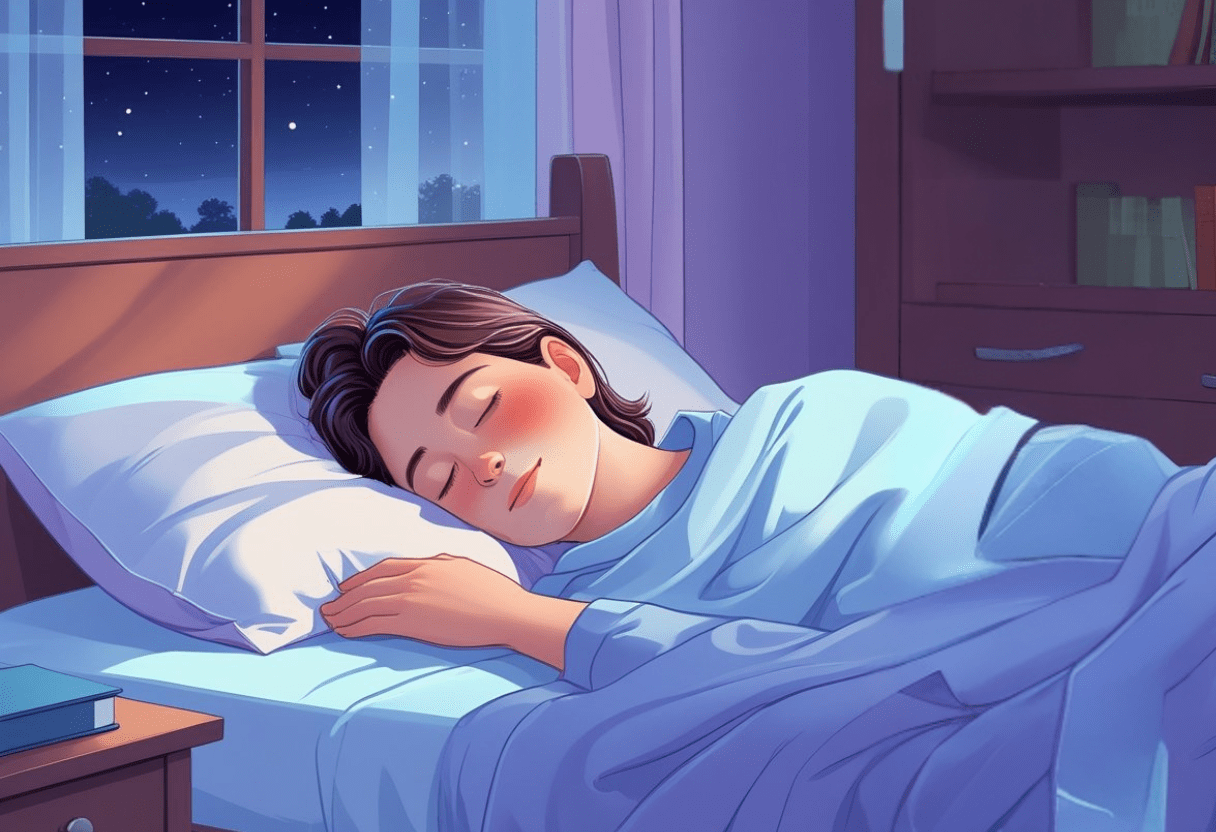
How Anemia Affects Sleep
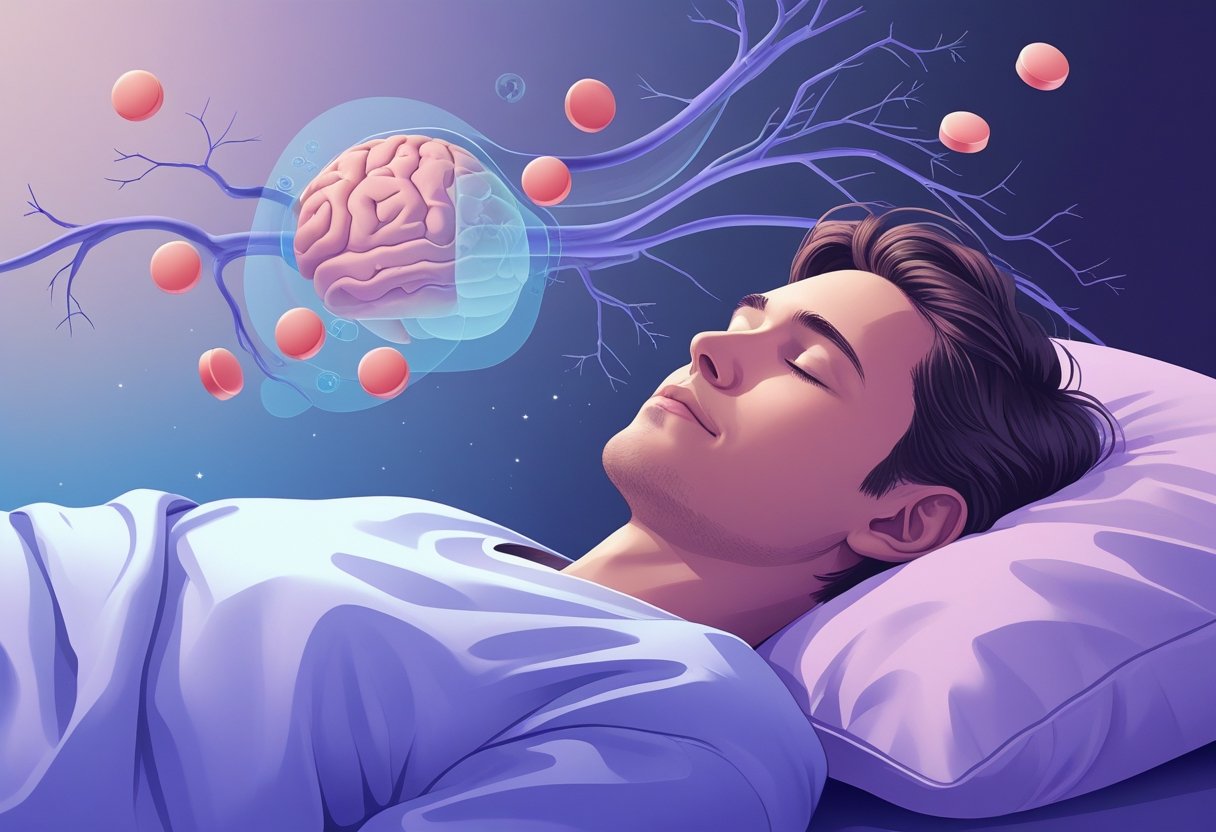
Anemia, especially when caused by low iron, can seriously affect a person ‘s sleep. It can lead to trouble falling asleep, waking up several times during the night, and feeling uncomfortable in bed. Iron plays a big role in keeping the body’s sleep cycles balanced and affects how much energy and comfort we feel during the day.
Common Sleep Disturbances in Anemia
People with anemia can have a hard time getting good rest. Low iron means less oxygen reaches the brain, which can cause lighter, broken sleep. Studies show that people with anemia are more likely to have insomnia and other sleep problems than those without it. Many also wake up frequently or feel like they’re not getting deep rest. Low ferritin, the protein that stores iron, is linked to poor sleep in adults. These issues don’t usually go away until anemia is treated and iron levels return to normal.
Daytime Fatigue and Sleep Quality
Low iron makes the body produce less energy, which causes tiredness during the day. Even after sleeping longer, people with anemia may still wake up feeling drained because their rest isn’t refreshing. This kind of fatigue affects focus, mood, and productivity. Treating anemia through supplements and diet can help restore energy and improve sleep quality. Fixing the sleep issues tied to anemia is key to breaking the cycle of exhaustion.
Restless Legs Syndrome and Anemia
Restless Legs Syndrome (RLS) is another problem linked to low iron and anemia. It causes a strong urge to move the legs due to uncomfortable sensations, especially at night. This can keep someone from falling asleep or cause them to wake up repeatedly. Research shows that low iron in the brain contributes to RLS. Treating anemia and raising iron levels can ease these symptoms and lead to better sleep. Managing RLS is important for anyone dealing with anemia, as it helps improve rest and reduce overall fatigue.
The Link Between Anemia and Insomnia
Anemia, especially from low iron levels, is closely linked to sleep problems like insomnia. Studies show that people with low hemoglobin or ferritin levels have a harder time falling or staying asleep. Here’s how anemia affects sleep, the role iron plays, and how different types of anemia impact the severity of insomnia.
Can Anemia Cause Insomnia?
Research shows that people with anemia are more likely to experience insomnia than those without it. Anemia happens when hemoglobin levels drop below 12.0 g/dL in women or 13.0 g/dL in men. Studies suggest that people with anemia are around 1.3 to 1.4 times more likely to struggle with insomnia. This connection remains even after considering age, gender, inflammation, and other health issues. While anemia doesn’t directly cause insomnia, it raises the risk. Other conditions related to anemia, like low iron or chronic illness, may also interfere with normal sleep patterns.
Low Iron and Sleep Problems
Iron deficiency is one of the main reasons people develop anemia, and it’s strongly connected to sleep issues. When iron levels are too low, the brain struggles to maintain chemical balance and oxygen flow, which affects how sleep is regulated. People with low iron often deal with insomnia and restless leg syndrome, both of which interrupt sleep.
Low ferritin, which shows how much iron your body has stored, is also linked to poor sleep quality. Iron is important in making neurotransmitters like dopamine that control sleep cycles. Because of this, low iron can cause insomnia, but treating the deficiency can improve rest.
Insomnia Severity and Anemia Type
The intensity of insomnia can depend on how severe the anemia is and what type it is. Mild anemia might bring light sleep troubles, while more serious anemia can cause stronger insomnia symptoms. Iron deficiency anemia shows a stronger connection to insomnia and restless leg syndrome compared to other types. Chronic anemia from kidney problems or inflammation can also affect sleep, but the cause may differ from iron deficiency.
Knowing these differences helps guide proper treatment. Correcting iron levels can lead to better sleep, but some people with anemia may also have sleep apnea, which adds to fatigue and makes it harder to treat both conditions.
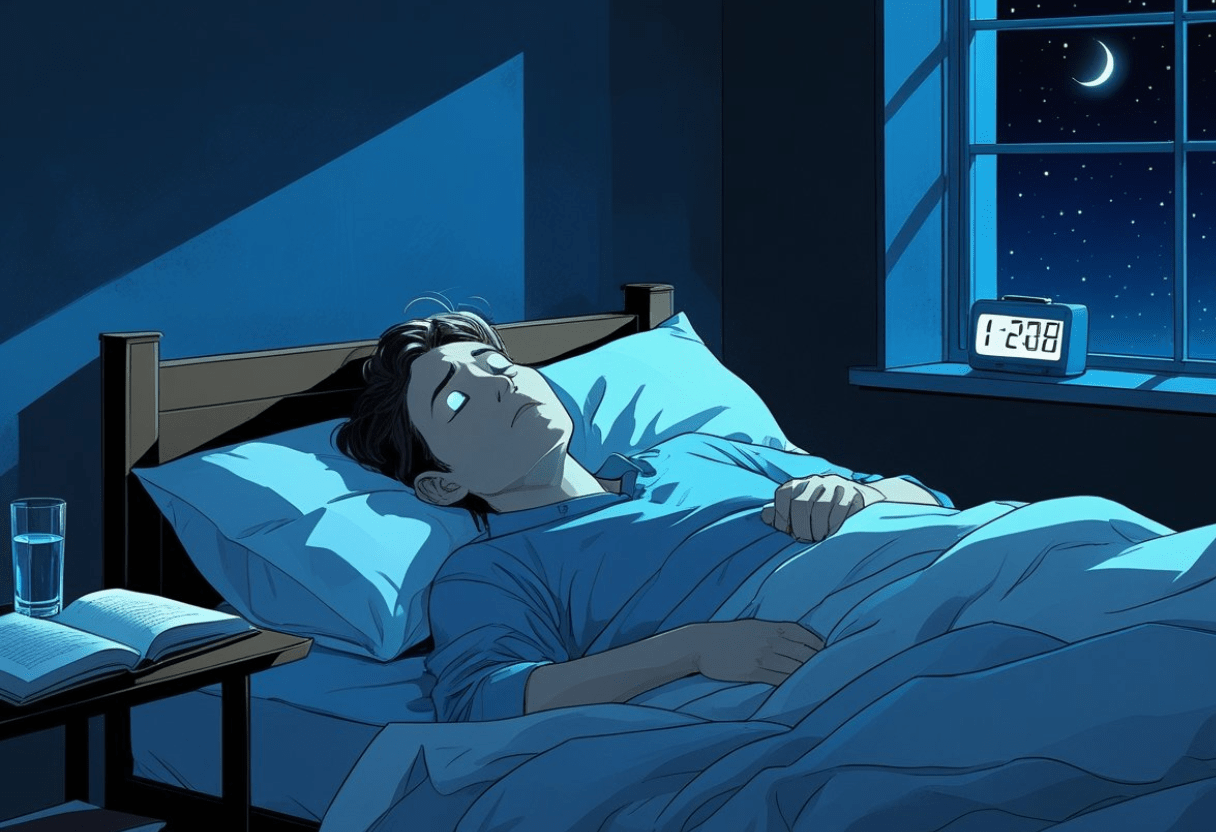
Iron Deficiency, Ferritin, and Restorative Sleep
Ferritin measures how much iron is stored in the body and can reveal how well it supports healthy sleep. When ferritin levels are low, people may experience sleep issues like restless legs syndrome (RLS). This can happen in both adults and children and leads to sleep that feels broken or unrefreshing.
Role of Iron and Ferritin in Sleep Regulation
Iron helps the brain produce dopamine, a chemical that affects movement, mood, and the body’s sleep rhythm. When iron levels drop, dopamine production slows down, which can throw off this rhythm. That’s one reason low ferritin is connected to restless legs syndrome, where the urge to move interrupts sleep. Research has found that people with ferritin levels under 50 ng/mL are more likely to deal with sleep issues. Low iron levels can also lead to periodic limb movements during sleep, causing the body to move repeatedly through the night. These small movements can stop deep, restful sleep from happening.
Iron deficiency affects parts of the brain like the basal ganglia and hippocampus, areas that help control movement and memory. When these regions don’t get enough iron, sleep can feel shallow and unrefreshing. Over time, this can leave a person tired even after a full night in bed.
Does Iron Help You Sleep?
For those who are low in iron, supplements can help improve sleep quality. Studies show that iron therapy, whether taken by mouth or through an IV, can ease symptoms of RLS and reduce nighttime awakenings. Both kids and adults with restless sleep patterns tend to rest better once their iron levels improve. Iron also plays a role in producing neurotransmitters and carrying oxygen through the blood, two things that the brain relies on for good sleep. Still, iron supplements aren’t a fix for everyone. People with normal iron levels usually don’t notice much change in their sleep after taking them.
Does Taking Iron at Night Keep You Awake?
Many people wonder if taking iron at night will cause them to stay awake. Most studies say it doesn’t. Iron itself doesn’t trigger insomnia or alertness. That said, some people feel mild side effects like stomach pain or nausea when taking iron late in the day, which can make falling asleep harder. In those cases, taking it in the morning might be better. A few people have trouble sleeping after iron infusions, but that’s uncommon.
Iron should always be taken as instructed by a doctor to avoid side effects. In general, when iron levels are managed properly, sleep tends to improve, not get worse. For more on iron’s role in sleep and treatment options, see research on iron deficiency and sleep.
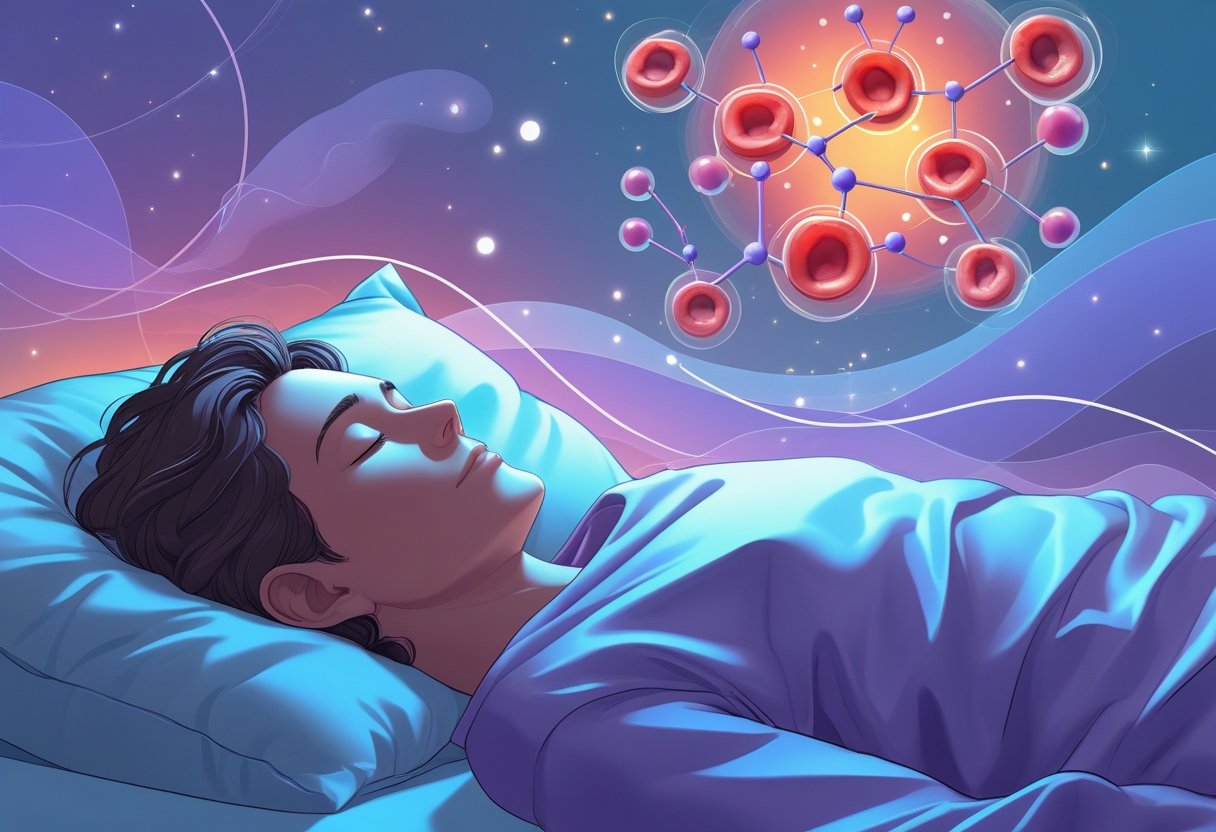
Sleep Apnea, Sleep Disorders, and Anemia
Sleep apnea and other sleep disorders can impact oxygen levels and blood health. These conditions lower the body’s oxygen levels, which affects how red blood cells are made and how the body uses iron. Understanding how they connect helps in managing symptoms such as tiredness and poor sleep quality.
Can Sleep Apnea Cause Anemia?
Sleep apnea causes repeated pauses in breathing during sleep, which reduces oxygen levels in the blood. When oxygen is low, the body struggles to produce enough healthy red blood cells, and this can lead to anemia. It becomes harder for the body to deliver oxygen to vital organs.
People with sleep apnea may have lower hemoglobin levels, which is a sign of anemia. As oxygen levels drop, the body tries to produce more red blood cells, but it’s not always enough to ease symptoms like weakness and fatigue. The lack of proper oxygen makes anemia worse and affects sleep quality. Sleeping position also plays a role. Lying on your side can reduce breathing pauses, helping maintain better oxygen levels during sleep. This can indirectly support better blood health and ease some anemia symptoms.
How Sleep Disorders Interact with Iron Deficiency
Iron deficiency anemia is linked to sleep issues such as insomnia and restless legs syndrome. When the body doesn’t have enough iron, oxygen transport slows down. This causes fatigue that disrupts normal sleep patterns.
Restless legs syndrome is common in people with low iron. It creates an uncomfortable urge to move the legs at night, interrupting rest and causing tiredness the next day. Other sleep disorders can also worsen anemia symptoms by disturbing oxygen and blood flow. Even some treatments for anemia, like iron supplements, may interfere with sleep and cause restlessness.
Treating both iron deficiency and sleep disorders together can improve symptoms and overall well-being. Adjusting diet, taking supplements, and addressing sleep problems help restore energy and improve quality of life. For more on anemia and sleep disruptions, review Saatva’s discussion on anemia’s connection to sleep issues.

Managing Sleep Problems Related to Anemia
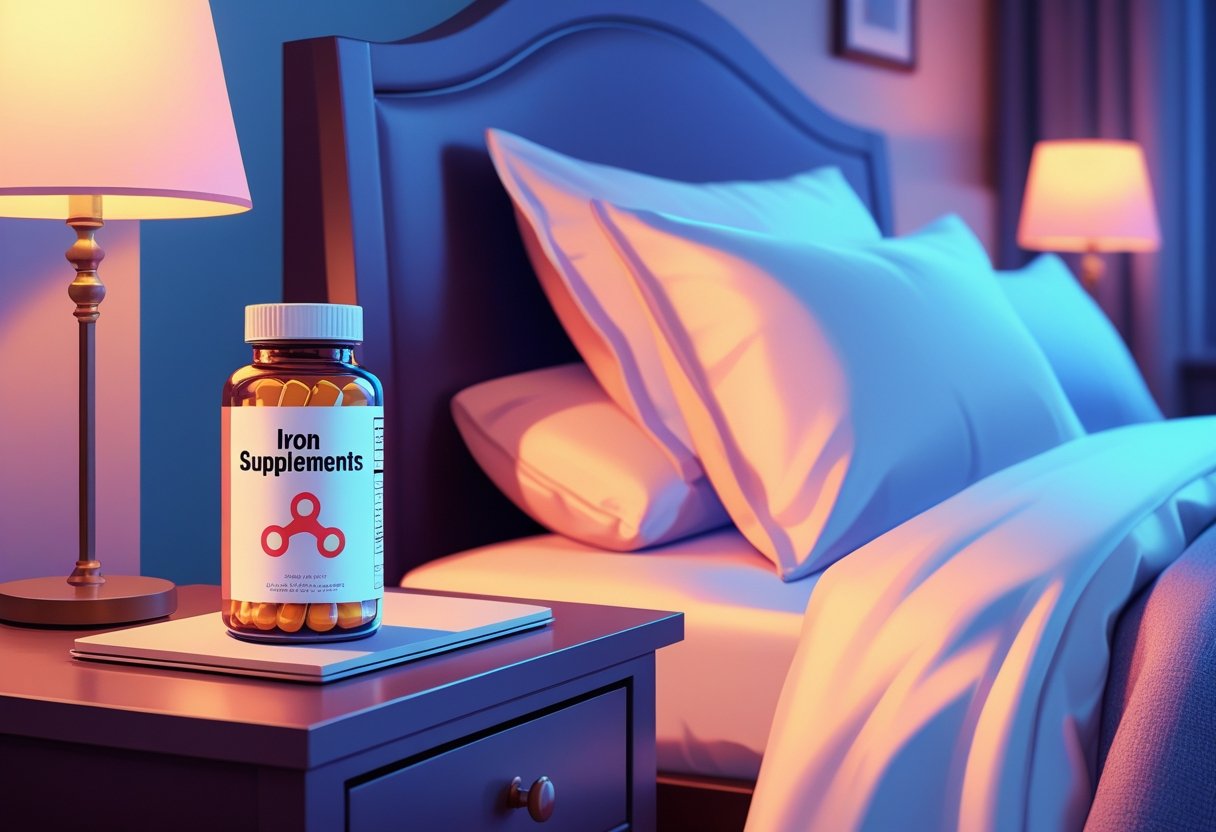
Sleep problems related to anemia usually happen because low iron levels affect how the body rests. When iron is low, oxygen doesn’t circulate properly, which can leave a person tired even after sleeping. The good news is that proper treatment, daily habits, and enough rest can help improve how the body recovers.
Treatment and Sleep Improvement Strategies
Managing anemia starts with fixing iron levels through supplements or diet changes. Iron supplements help reduce tiredness and support better sleep once the body starts to regain balance. It’s best to do this under a doctor’s care to make sure the dosage is safe and effective. In some cases, anemia can cause sleep issues like restless legs or insomnia. When that happens, treating anemia alone might not be enough. A doctor might suggest other treatments, such as medication or sleep therapy, to help ease those symptoms.
Regular checkups are important to monitor iron levels and track changes in sleep. When treatment and good sleep habits work together, they can help lessen sleep disruptions and bring back consistent rest.
Lifestyle and Sleep Hygiene for Anemic Patients
Healthy sleep routines are important in recovery. People with anemia should keep a steady sleep schedule, avoid caffeine and large meals before bed, and rest in a calm, dark space. Light activity during the day, like walking or stretching, can improve energy, but it’s best to avoid hard exercise before sleeping. Calming habits such as breathing exercises or light stretches before bed can also help the body relax.
Since anemia causes low energy, finding balance is important. Sleeping too much can sometimes make a person feel even more sluggish. Keeping regular sleep hours helps the body recover without overdoing rest.
Determining How Much Sleep an Anemic Person Needs
People with anemia might need more sleep than usual because their bodies are working harder to restore energy and oxygen flow. Most adults need about 7 to 9 hours each night, but those with anemia may need a bit more while healing. Sleep needs vary depending on how severe the anemia is and how a person feels day to day. Listening to the body is key. Rest when needed, but watch out for sleeping too long. Oversleeping can be a sign that the condition needs more attention.
Tracking sleep patterns and how rested you feel can help find the right balance. Quality rest supports recovery, but too much sleep can slow things down.
When to Seek Help and Potential Risks
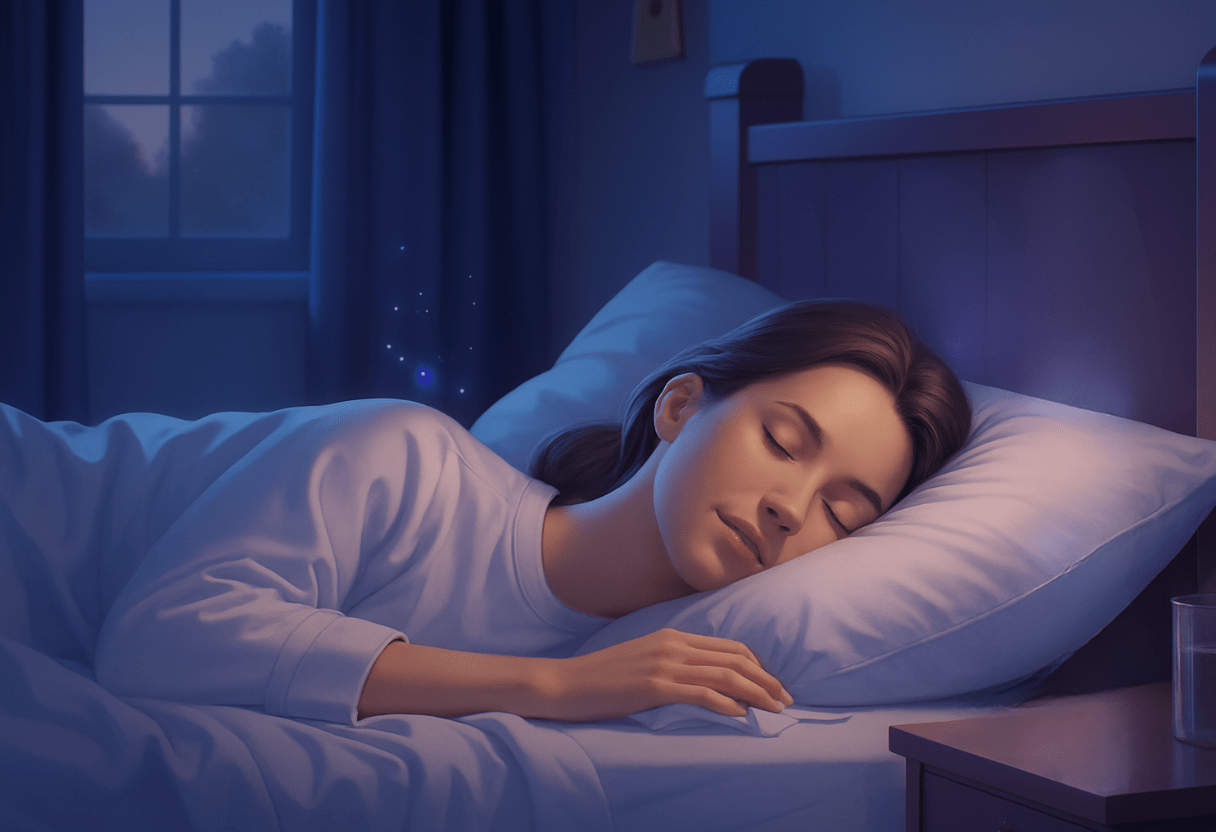
Anemia can cause serious health issues if it’s not treated, especially when it starts affecting sleep. Noticing the warning signs early can prevent long-term problems. In some cases, low oxygen during sleep can become dangerous and needs quick medical care.
Warning Signs and Medical Attention
People with anemia may feel weak, tired, or lightheaded. If these symptoms last more than two weeks without a clear reason, it’s time to see a doctor. Shortness of breath or chest pain, especially while resting or sleeping, should never be ignored.
Other signs include pale skin, cold hands, and frequent headaches. When these symptoms come with poor sleep or restlessness at night, it could mean the body isn’t getting enough iron or oxygen. A doctor can confirm if it’s anemia and start treatment to prevent further problems. Feeling drained even after sleeping is a strong sign that something’s wrong.
Long-Term Health Impacts of Anemia and Sleep Issues
Living with untreated anemia can worsen sleep troubles such as insomnia or restless legs. When sleep quality drops, stress levels rise, and that makes anemia harder to control. Over time, this cycle affects focus, weakens the immune system, and lowers overall energy.
Anemia can also throw off brain chemicals like serotonin and dopamine, which help regulate sleep. This leads to trouble falling asleep or staying asleep. Poor sleep then reduces red blood cell production, making anemia worse. People might deal with constant fatigue, body aches, or low stamina if they don’t get treatment early. Managing both anemia and sleep issues helps avoid long-term health damage.
Severe Anemia Risks During Sleep
Severe anemia means the blood isn’t carrying enough oxygen. This forces the heart and lungs to work harder, especially at night. It can cause irregular heartbeats or breathing problems while sleeping. In very rare cases, low oxygen levels from extreme anemia have led to sudden death during sleep.
Anyone with low hemoglobin should take chest pain or breathing trouble at night seriously. If those symptoms show up, emergency care might be needed. While anemia itself isn’t usually fatal during sleep, the heart and lung strain it causes can be dangerous. Keeping iron levels checked and following a doctor’s plan helps prevent these risks. More details about when to see a doctor and how to manage anemia’s effect on sleep can be found in this article on anemia symptoms and causes.
How the Right Mattress Can Support Better Sleep for Anemia
People with anemia can have trouble sleeping because of body pain, discomfort, or restless legs. Choosing the right mattress can ease these issues and help you rest more peacefully. Good sleep is important for recovery, and the right bed can help you feel more comfortable through the night. A mattress that keeps your spine straight helps prevent pressure on muscles and joints, which reduces pain while sleeping. A medium-firm bed is usually the best choice because it gives solid support without feeling too hard. This balance is especially helpful for people who get tired easily or wake up sore.
It’s also important to have a mattress that relieves pressure. When your weight is spread out evenly, you move less and sleep more deeply. Materials like memory foam or latex gently adjust to your body’s shape, easing tension and keeping you relaxed. Temperature control matters too. Some people with anemia feel too cold or too warm at night. A mattress with breathable layers and cooling materials keeps your body at a steady temperature, which helps your circulation and comfort.
Qualities to look for in a mattress for anemia-related sleep issues:
- Medium-firm feel for balanced support
- Pressure relief to reduce body pain
- Proper spinal alignment
- Temperature regulation for steady comfort
If you want a bed that can be adjusted to your needs, the Saatva Classic Mattress is a good option. It offers several firmness choices, strong lumbar support, and a cool, breathable design. It’s built to help you sleep comfortably and wake up feeling refreshed.
The Saatva Classic is built with a dual-coil system that gives both support and bounce. It has a 3-inch Euro pillow top that adds soft cushioning without losing structure. Inside, there’s a layer of foam-encased coils plus a support coil base to keep the mattress stable and prevent sagging. The cover is made from organic cotton, which lets air pass through and helps with cooling. You can choose from three firmness levels and two height options, so you can match it to how you sleep and your room setup.

Frequently Asked Questions
Anemia can cause changes in sleep patterns due to symptoms like fatigue and restless legs. Sleep quality often decreases, resulting in frequent awakenings and difficulty falling asleep. Treating anemia may help reduce these issues.


